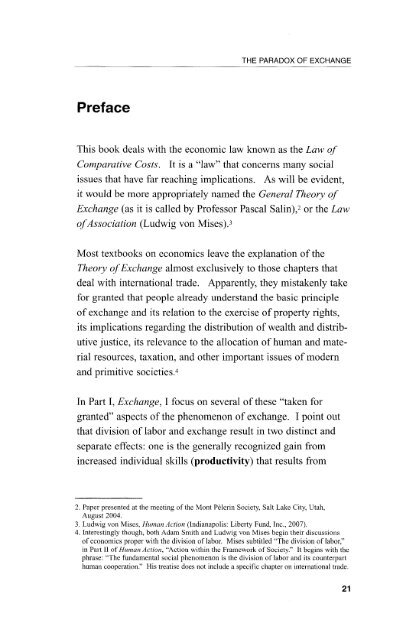Not a Zero-Sum Game - Ludwig von Mises Institute
Not a Zero-Sum Game - Ludwig von Mises Institute
Not a Zero-Sum Game - Ludwig von Mises Institute
Create successful ePaper yourself
Turn your PDF publications into a flip-book with our unique Google optimized e-Paper software.
Preface<br />
THE PARADOX OF EXCHANGE<br />
This book deals with the economic law lcnown as the Law of<br />
Comparative Costs. It is a "law" that concerns many social<br />
issues that have far reaching implications. As will be evident,<br />
it would be more appropriately named the General Theory of<br />
Exchange (as it is called by Professor Pascal Salin),2 or the Law<br />
of Association (<strong>Ludwig</strong> <strong>von</strong> <strong>Mises</strong>).3<br />
Most textbooks on economics leave the explanation of the<br />
Theory of Exchange almost exclusively to those chapters that<br />
deal with international trade. Apparently, they mistakenly take<br />
for granted that people already understand the basic principle<br />
of exchange and its relation to the exercise of property rights,<br />
its implications regarding the distribution of wealth and distrib-<br />
utive justice, its relevance to the allocation of human and mate-<br />
rial resources, taxation, and other important issues of modern<br />
and primitive societies.4<br />
In Part I, Exchange, I focus on several of these "taken for<br />
granted" aspects of the phenomenon of exchange. I point out<br />
that division of labor and exchange result in two distinct and<br />
separate effects: one is the generally recognized gain from<br />
increased individual sltills (productivity) that results from<br />
2. Paper presented at the meeting of the Mont Pelerin Society, Salt Lake City, Utah,<br />
August 2004.<br />
3. <strong>Ludwig</strong> <strong>von</strong> <strong>Mises</strong>, Hzlrnan Action (Indianapolis: Liberty Fund Inc., 2007).<br />
4. Interestingly though, both Adam Smith and <strong>Ludwig</strong> <strong>von</strong> <strong>Mises</strong> begin their discussions<br />
of economics proper with the division of labor. <strong>Mises</strong> subtitled "The division of labor,"<br />
in Part I1 of Human Action, "Action within the Framework of Society." It begins with the<br />
phrase: "The fundamental social phenomenon is the division of labor and its counterpart<br />
human cooperation." His treatise does not include a specific chapter on international trade.

















